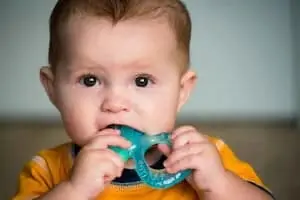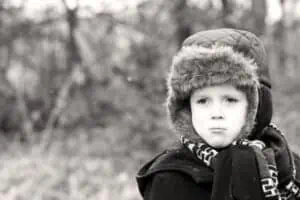It’s normal for parents to work on everything their baby does, and when you see your baby sucking on his bottom lip, you want to ensure everything is okay.
Babies sometimes have strange behaviors, and we don’t always understand them. So, that makes us worry that it could be a sign of trouble. So, when you see your baby biting his bottom lip, you wonder if he’s hungry or has an oral health problem.
You should know that your baby sucking on his bottom lip is not a severe issue before you panic. It might be a calming behavior for your child, but it doesn’t indicate anything is a problem.
How to Know if Your Baby is Sucking on His Bottom Lip

You might catch your baby sucking on his bottom lip, but he might do it periodically, and you don’t notice. There can be other clues that your baby has developed this habit.
Chapped Areas
Like when you lick your lips too much, sucking on your lips can cause a chapped area to develop along the lips. It can cause the entire area to be red and irritated.
Bruises Around the Bottom Lip
Another sign is that your baby might develop a bruise on or around their bottom lip that seems unexplainable. It could be because they’re sucking so hard on their bottom lip that it leaves a bruise. It might start as a red mark that gradually changes to a bruise.
Why Is My Baby Chewing on Her Bottom Lip?
Whether your baby is chewing or sucking on her lip, it typically is for a reason. Here are some of those reasons!
Teething

No one likes when their baby starts to teethe; it tends to be a dreaded time. We’ve all heard babies crying all night, chewing their fists, or doing anything they can because of discomfort.
Thankfully, not all babies experience this discomfort. Some babies handle the pain of teething like a champ; you might not even realize your baby is teething until you see a little tooth popping up!
Relative: Is your teething baby sleeping more? Here is why:
If you see your baby sucking on his lip or smacking his lips, it could be a sign of teething. Teething doesn’t always hurt, but it can feel strange, so he might be exploring those feelings. To determine if teething is the problem, look for other signs, such as:
- Excessive drool
- Rosy cheeks
- Hardened gums
Self-Soothing
Babies like to feel comfortable and cozy; they often suck on their thumbs in the womb or prefer a pacifier because sucking is soothing. So, instead of sucking on his thumb or a pacifier, you might find your baby sucking on his bottom lip as a soother.
Relative: Is the baby using your breast as a pacifier? Here is what to do.
Babies naturally want to soothe themselves. So, whatever is close and makes your baby feel better, he will use it instead. His lip is right there after all, and combined with the sucking motion, your baby might think his lip is a great substitute for a pacifier.
Other common self-soothing behaviors your baby might show include:
- Sucking his thumb or a pacifier
- Needing particular objects, such as a blanket or stuffed animal
- Rubbing parts of their body or their parents’ bodies, such as your arm
- Rocking back and forth
- Pulling on their hair
Hunger
So, if your baby isn’t teething or trying to self-soothe, lip-sucking might be a sign of hunger. Not all babies cry when they’re hungry; they can show a lot of different signs. That can make it hard to know if your baby is hungry, especially if he isn’t due for feeding. However, remember that babies go through growth spurts or cluster feeding, leading to lip-sucking.
Stress

Yes, babies can be stressed. They are tired, fussy, and overstimulated, which leads to stress for your baby. Overstimulation can come from passing your baby from person to person.
When a baby is stressed or anxious, you might notice more self-soothing behavior, such as bottom lip sucking or thumb sucking. You should watch for other signs that your baby is stressed, such as:
- Squirming
- Hiccups
- Excessive Crying
- Changes in Eating Habits
- Change in Sleeping Habits
- Frantic Body Movements
When you notice these types of behaviors, it means you need to calm your baby. Try some calming techniques like a baby massage to help your overstimulated baby.
Is It Bad If My Baby Keeps Sucking on Her Bottom Lip?
In most cases, if you’re wondering why babies chew on their bottom lip or suck on their lips, it’s not a problem. Most babies will outgrow this by six to eight months of age, but some might refuse to give it up. That might cause you to worry if something is wrong with your baby.
It’s rarely a medical problem but could cause oral health issues.
If your baby is sucking on his bottom lip for long periods, it could lead to an overbite. That can affect his chewing and alignment of his teeth once they all appear.
So, if your baby continues to do so after his first birthday, talk to your baby’s doctor. He might have suggestions for why this could happen, such as stress or anxiety.
Biting Could Be Dermatophagia
Suppose your baby continues to bite and chew rather than suck on his lip. In that case, it could be dermatophagia, a disorder that compulsively causes a person to bite their skin, especially their fingers. People with dermatophagia tend to chew the skin on their nails, knuckles, and the inside of their mouths.
Dermatophagia is typically more common when someone feels stressed or anxious; it’s an obsessive-compulsive disorder. Babies are too young to receive an OCD diagnosis, but that doesn’t mean they cannot already suffer from dermatophagia.
Wrapping It Up
You might find your baby sucking on his bottom lip for various reasons. There is no reason to worry in most cases, but you should always pay attention to any symptoms that might develop. If the behavior doesn’t stop or worsens, talk to your pediatrician to develop a plan.
Hey, this is Linda. My biggest accomplishment in life is being a mother of four children. Their current ages range from almost ten years old down to 20 months old.
I’m passionate about writing parenting articles because I understand so well all of the problems and trials you face as a parent. From breastfeeding woes to budgeting problems and behavior problems, along with everything in between, chances are I’ve faced it over the last ten years. Read more about Linda here.






